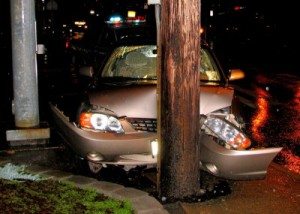Car accidents are chaotic, and fault isn’t always black-and-white. While fault is obvious in some scenarios – for example, a driver who rear-ends someone waiting at a red light – there many cases where both parties share some measure of blame for the crash. In this article, Philadelphia car accident lawyer, Brent Wieand, will discuss liability and no fault coverage in Pennsylvania and New Jersey.
Depending on the state you are in, there are different laws regarding whether you can recover damages if you are partially at fault.

Pennsylvania and New Jersey both use a comparative fault system. This means that you can still recover damages even if you were partially at fault for the accident. However, your recovery will be reduced pro-rata by the percentage you are found to be liable for the accident.
However, there are some benefits which will be paid regardless of who was at fault for the accident. Pennsylvania and New Jersey both use a no-fault system when it comes to payment of medical bills. In the no-fault system, it essentially doesn’t matter which party caused the car accident. In light of this fact, no-fault policies in Pennsylvania and New Jersey provide Personal Injury Protection (PIP) benefits. Regardless of fault, compensation for injuries is covered up to the PIP limit.
While drivers in no-fault states aren’t required to prove fault in order to get first party PIP benefits through their insurer, in order to recover non-economic damages (e.g. pain and suffering, physical impairment, loss of consortium) you must make a claim with the other driver’s insurance or file a lawsuit against the other driver.
If you are injured in a car accident, YOUR insurance selection may determine whether you can recover compensation for pain and suffering. Pennsylvania insurance companies offer full tort and limited tort coverage. New Jersey offers a similar scheme known as Limitation on Lawsuit Option or Verbal Threshold insurance.
Motorists are encouraged to select Full Tort coverage (PA) or No Limitation on Lawsuit Option (NJ). If you select Limited Tort coverage (PA) or Verbal Threshold (NJ), you will pay less each month, but will be limited in your ability to sue for non-economic damages if you ever get into an accident. Full Tort / No Lawsuit Limitation coverage costs a little more, but will preserve your right to pursue non-economic damages, such as compensation for the pain and suffering caused by your accident.
If you select the Limited Tort or Limitation on Lawsuit option, you may sue for non-economic damages only if you meet the state’s threshold for serious injuries or fall under certain other limited exceptions set forth in the statute.
The applicable Pennsylvania statute, 75 Pa. Cons. Stat. § 1705, reads as follows:
“The laws of the Commonwealth… give you the right to choose a form of insurance that limits your right… to seek financial compensation for injuries caused by other drivers… [You] may seek recovery for all medical and other out-of-pocket expenses, but not for pain and suffering or other nonmonetary damages unless the injuries suffered fall within the definition of ‘serious injury.’”
The statute goes on to add that “unless the injury sustained is a serious injury, each person who is bound by the limited tort election shall be precluded from maintaining an action for any noneconomic loss.” This reiterates precisely what we were just discussing: that, under Pennsylvania’s Limited Tort coverage option, you cannot sue for non-economic damages unless you suffer severe injuries, as a Philadelphia car accident lawyer can explain.
But what, exactly, counts as a “serious injury” by Pennsylvania standards?
New Jersey’s serious injury thresholds are similar, and include the following:
In NJ, to meet the threshold, a medical expert must certified that an injury is permanent, and the plaintiff asserts that his or her life is negatively impacted by the injury. In some cases, this can extend to include soft tissue injuries.

If you were seriously injured in a car accident in New Jersey or Pennsylvania, and you’re unhappy with the way your insurance company is handling your claim, you may be able to recover compensation by filing a lawsuit against the driver who hit you. To talk about your accident in a free, completely confidential legal consultation with an experienced car accident lawyer in Philadelphia, PA, call Brent Wieand at 1(888) 789-3161. Brent will give you a clear and straightforward assessment of your case, and will help you understand your legal options as an injury victim.
***Disclaimer: This article is for informational purposes. It is not legal advice and should not be used as legal advice***